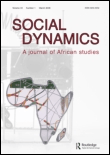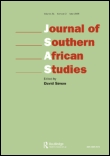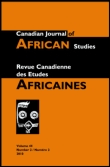
SOUTHERN CULTURES
Scope & Guideline
Navigating the Depths of Southern Cultural Expression
Introduction
Aims and Scopes
- Cultural Narratives and Identity:
The journal explores the rich tapestry of cultural narratives that define Southern identity, including literature, folklore, music, and art, highlighting the complexities of race, class, and gender. - Political and Social Movements:
It addresses significant political and social movements within the South, particularly those related to civil rights, voting rights, and grassroots activism, offering critical analyses of their impact on society. - Environmental and Ecological Concerns:
The journal emphasizes the intersection of culture and ecology, examining how environmental issues affect Southern communities, especially in the context of climate change and resource management. - Historical Perspectives:
Southern Cultures provides historical analyses that contextualize contemporary issues, drawing connections between past injustices and present-day challenges in the region. - Community Engagement and Activism:
The journal highlights stories of community resilience and activism, showcasing how local groups and individuals respond to social and environmental challenges.
Trending and Emerging
- Voting Rights and Democracy:
A significant trend is the renewed focus on voting rights, particularly in light of recent political developments, emphasizing the struggles and strategies within the South to secure democratic participation. - Climate Justice and Environmental Activism:
Emerging themes highlight the intersection of environmental issues and social justice, particularly how marginalized communities in the South are affected by and respond to climate change. - Intersectionality and Identity Politics:
There is an increasing focus on intersectionality, exploring how overlapping identities—such as race, gender, and class—shape experiences and cultural expressions in the South. - Narratives of Resilience and Resistance:
The journal is highlighting narratives of resilience and resistance, showcasing grassroots movements and community efforts to address systemic injustices. - Cultural Memory and Historical Reckoning:
Emerging discussions around cultural memory and the need for historical reckoning are prominent, reflecting the South's ongoing struggles with its past and its implications for the future.
Declining or Waning
- Traditional Southern Agrarianism:
Topics centered around traditional agrarian lifestyles and rural Southern life have seen a decrease, possibly overshadowed by more contemporary issues like urbanization and climate change. - Historical Southern Stereotypes:
Explorations of historical Southern stereotypes and their cultural implications are less frequent, as the journal shifts towards more nuanced discussions of identity and intersectionality. - Regionalism in Isolation:
The focus on Southern culture as an isolated phenomenon has waned, with a growing emphasis on transnational and cross-cultural influences that shape Southern identity today. - Monolithic Representations of Southern Culture:
There is a noticeable decline in papers that treat Southern culture as a monolith, as the journal increasingly embraces complexity and diversity within the region.
Similar Journals

Aboriginal Policy Studies
Advancing Indigenous Voices in Policy DiscourseAboriginal Policy Studies is a pioneering open-access journal published by the University of Alberta that has been dedicated to the examination of issues, policies, and practices affecting Aboriginal communities in Canada and beyond since 2011. With its ISSN 1923-3299, this journal serves as a vital platform for researchers, professionals, and students committed to advancing knowledge and understanding of Indigenous rights, governance, and social justice. The journal aims to foster interdisciplinary discourse by publishing high-quality original research, critical analyses, and case studies that address the complexities of Aboriginal policy. Given its commitment to accessibility and rigor, Aboriginal Policy Studies is an essential resource for anyone engaged in the fields of sociology, political science, and Indigenous studies, striving to amplify Indigenous voices within scholarly dialogue.

MEXICAN STUDIES-ESTUDIOS MEXICANOS
Charting New Territories in Latin American ScholarshipMEXICAN STUDIES-ESTUDIOS MEXICANOS, published by University of California Press, is a distinguished journal that explores critical issues in the fields of cultural studies and history, with a keen focus on Mexican and Latin American contexts. Established in 1985, this journal serves as an invaluable platform for researchers, professionals, and students alike, aiming to deepen understanding of Mexico's complex social, cultural, and historical landscapes. With an impressive placement in the Q2 category in both Cultural Studies and History, it ranks within the top tiers of scholarly discourse, demonstrating a strong impact factor that reflects its significance in the academic community. Although it does not currently offer Open Access, the journal remains committed to delivering high-quality, peer-reviewed research that stimulates ongoing debates and enriches scholarship in the humanities and social sciences. Nestled at the heart of scholarly conversations, MEXICAN STUDIES-ESTUDIOS MEXICANOS continues to play a pivotal role in advancing academic inquiry into Mexico's past and present.

Trashumante-Revista Americana de Historia Social
Unveiling the Threads of Cultural, Political, and Economic NarrativesTrashumante-Revista Americana de Historia Social is a pivotal scholarly journal published by UNIV ANTIOQUIA that has been advancing the field of social history since its transition to an open access format in 2013. Operating from Colombia, this journal has established a considerable reputation within the academic community, achieving a Q2 ranking in History and a Q4 ranking in Social Sciences (Miscellaneous) as of 2023. With an emphasis on interdisciplinary research, it aims to foster scholarly dialogue by covering diverse aspects of social history, including cultural, political, and economic dimensions across the Americas. Researchers, professionals, and students are encouraged to access its wealth of knowledge, as it is freely available to audiences worldwide, reflecting the journal's commitment to improving accessibility and fostering academic discourse. With Scopus rankings positioning it in the 43rd percentile for History and 15th percentile for General Social Sciences, Trashumante remains an essential resource for those dedicated to exploring and understanding the intricate tapestry of social historical narratives.

JOURNAL OF SOUTHERN HISTORY
Bridging Past and Present in Southern StudiesJOURNAL OF SOUTHERN HISTORY, published by the SOUTHERN HISTORICAL ASSOCIATION, is a prominent peer-reviewed journal that has been at the forefront of Southern historical scholarship since its inception. With an ISSN of 0022-4642 and a dedicated E-ISSN of 2325-6893, this esteemed journal provides an essential platform for the dissemination of cutting-edge research in the field of history, particularly focusing on the Southern United States. The journal has established itself as a crucial resource in the academic community, holding a Q2 ranking in History according to the 2023 Category Quartiles and achieving a notable rank of #657 out of 1760 in the Scopus Arts and Humanities History category, placing it in the 62nd percentile. While it does not offer open access options, the journal's rigorous curation of historical studies contributes significantly to advancing knowledge and understanding of Southern history. Researchers, professionals, and students alike will find invaluable resources in its well-curated articles and critical analyses. The journal continues to evolve, with coverage converged from various years, including 1959, with ongoing publications available through 2024, ensuring that it remains relevant within the academic discourse surrounding Southern history.

CURRENT HISTORY
Navigating the Nexus of Past and PresentCURRENT HISTORY, published by University of California Press, is a leading journal in the field of History, holding a prestigious Q1 category ranking in the 2023 Academic Journal Metrics. With an ISSN of 0011-3530 and an E-ISSN of 1944-785X, this journal has been a staple in the academic community since its inception, with issues dating back to 1977 and continuing through 2024. CURRENT HISTORY is renowned for its rigorous scholarship and insightful analyses of contemporary historical events, providing researchers, professionals, and students with a deep understanding of the past's influence on present and future dynamics. Although currently not offering open access, the journal is accessible through institutional subscriptions. With its impressive 92nd percentile ranking in the Scopus Arts and Humanities - History category, CURRENT HISTORY remains essential reading for those involved in historical research and discourse, fostering an engagement with historical narratives that shapes the global understanding of current events.

Social Dynamics-A Journal of African Studies
Advancing Interdisciplinary Insights on AfricaSocial Dynamics: A Journal of African Studies, published by Routledge Journals, Taylor & Francis Ltd, serves as a vital platform for discourse on contemporary issues affecting the African continent. With an ISSN of 0253-3952 and an E-ISSN of 1940-7874, this journal has been disseminating high-quality research since 1975 and converges through to 2024. It holds a commendable standing within the academic community, ranked in the Q3 quartile of social sciences and positioned at #344 out of 604 in its Scopus category. The journal aims to explore interdisciplinary themes that resonate within the social sciences, offering insights on the dynamic cultural, political, and economic landscapes of Africa. While the journal currently does not offer Open Access, its contributions remain indispensable for researchers, professionals, and students seeking to engage with the complexities of African studies and global implications. The journal's address is 2-4 Park Square, Milton Park, Abingdon OX14 4RN, Oxon, England, underscoring its commitment to scholarly excellence from the UK.

Slavia Meridionalis
Advancing interdisciplinary scholarship in Slavic studies.Slavia Meridionalis is a distinguished open-access journal published by the Polish Academy of Sciences, Institute of Slavic Studies, dedicated to advancing scholarly discourse in the fields of Anthropology, Cultural Studies, History, Linguistics and Language, and Literature and Literary Theory. With its ISSN 1233-6173 and E-ISSN 2392-2400, this journal has made significant strides in promoting research since its inception in 2014. Operating from Warsaw, Poland, Slavia Meridionalis aims to serve as a pivotal platform for researchers and students alike, fostering interdisciplinary collaboration and knowledge dissemination. The journal holds respectable rankings in its various categories, some achieving Q3 status, which reflects its commitment to quality scholarship within the academic community. By providing open access to its readership, Slavia Meridionalis ensures that pivotal research is readily available for the global audience, thus enhancing its relevance and impact across diverse fields.

JOURNAL OF SOUTHERN AFRICAN STUDIES
Fostering Critical Discourse on Southern Africa's Contemporary IssuesThe JOURNAL OF SOUTHERN AFRICAN STUDIES, published by Routledge Journals, Taylor & Francis Ltd, is a premier scholarly outlet dedicated to the exploration and analysis of social, political, and cultural dynamics affecting the Southern African region. With an established history since 1974, this journal features articles that contribute significantly to various disciplines, including Arts and Humanities, Sociology, and Geography, and is recognized within its fields as evidenced by its Q2 and Q3 quartile rankings in the latest assessments. Offering a rich academic platform for researchers, professionals, and students, it fosters interdisciplinary approaches and welcomes critical discourse on contemporary issues, ensuring relevance and impact in today's rapidly changing socio-political landscape. Notably, the journal has achieved commendable rankings on Scopus, affirming its standing as an influential source of knowledge. Although not open access, it remains a vital resource for those seeking to deepen their understanding of Southern Africa and its global implications.

CANADIAN JOURNAL OF AFRICAN STUDIES
Connecting Researchers with Africa's Vibrant Scholarly CommunityThe Canadian Journal of African Studies is a premier scholarly publication dedicated to the exploration and critical analysis of African cultures, societies, and histories. Founded in 1976 and published by Routledge Journals, Taylor & Francis Ltd, this journal serves as a vital platform for researchers, educators, and practitioners in various fields, including Anthropology, Cultural Studies, History, and Political Science. With its notable Scopus rankings, including a 96th percentile in History and a 89th percentile in Cultural Studies, the journal exemplifies academic excellence and influence within the social sciences. Although the journal does not currently offer open access options, it remains committed to providing high-quality research articles that contribute to the understanding of African issues in a global context. By addressing pressing social and political challenges, the Canadian Journal of African Studies not only serves academic interests but also fosters a deeper appreciation of Africa's diverse experiences and perspectives.

International Journal of Taiwan Studies
Empowering Scholars to Navigate Taiwan's Complex LandscapeInternational Journal of Taiwan Studies, published by BRILL, stands at the forefront of scholarly research on Taiwan, encompassing a broad spectrum of disciplines including Anthropology, Cultural Studies, History, Political Science, and more. With an ISSN of 2468-8797 and an E-ISSN of 2468-8800, this journal serves as a vital platform for researchers and professionals to explore Taiwan's multifaceted identity and its implications on contemporary global issues. As of 2023, it holds a commendable position within academic ranks, reflecting its impact with quartiles ranging from Q1 to Q3 across several categories. The journal is particularly noted for its contributions to Visual Arts and Performing Arts, ranking in the 85th percentile within the field. With its potential for open access options and commitment to innovative scholarship, the International Journal of Taiwan Studies is an invaluable resource for those seeking to deepen their understanding of Taiwanese society, culture, and politics, while engaging with an ever-evolving scholarly conversation.